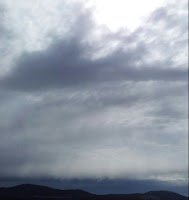Does the sky reflect light coming from the ocean which gives it its blue colour? This is a nice theory if you live close to the coast but let's say you are in Alice Springs -things get a bit dodgy. The reason why the sky is blue is fairly complex, but the fundamentals are fairly simple to grasp.
 |
| Blue sky over SE New South Wales 3 Sept 2012 |
In terms of the earth's history, a complete explanation of the blueness of the sky has been only a recent occurrence. A British chap by the name of Lord John William Strutt Rayleigh who was born in 1842 and died in 1919 was the first to explain why we see a blue sky and the process 'Rayleigh Scattering' was named after him.
Basically, when the sunlight arrives at the earth's atmosphere it is made up of different wavelengths which we see as different colours (for a visual effect go and find yourself a rainbow), but together look light white light.
When this mixture interacts with particles in the atmosphere like molecules of nitrogen or oxygen some of the light is scattered, whilst the rest is able to pass through with little scattering. In our atmosphere it is the shorter wavelengths or blues and violets which are preferentially scattered over the reds and yellows which go straight through the atmosphere. When we look at the sky we see the blue light which is being scattered all over the place. The sun looks yellow as the blue part of the spectrum has been removed from the white light which has travelled directly to our eyes (and is probably damaging them so try not to do it).
The sky is not all the same shade of blue, towards the horizon the blue fades towards white as the proportion of blue light to the other colours diminishes. You can see this effect in the picture above. One day I'll have a look at other colours in the sky but at the minute we will stay with the blue sky thinking.
So is the sky reflecting the blue ocean? No, in fact the ocean is more likely to be reflecting the sky (with some of its own Rayleigh scattering in the water to add to the effect).




